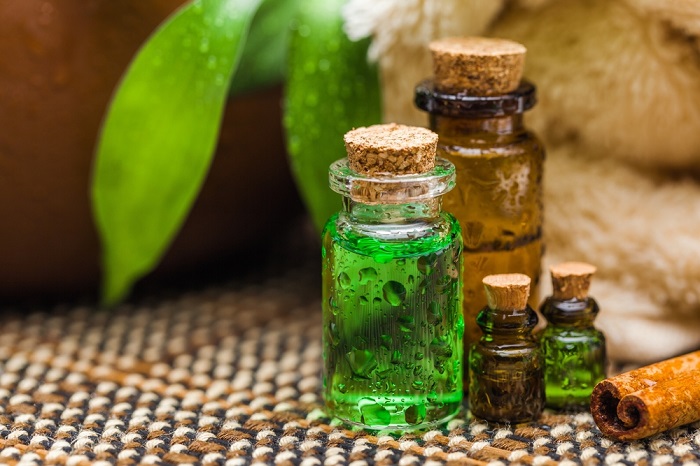Tea tree oil and all its benefits

The tea tree called Melaleuca alternifolia is native to Australia and used by local indigenous people (Aborigines) it has long been a popularly used home remedy.

The first records are in the botanist Dr. Joseph Banks, who arrived with the British explorers, James Cook in 1770 to Australia. He saw how the Aborigines used a decoction of tea tree leaves to heal various skin problems and treat wounds.
After a period of neglect of this oil and its properties, in 1925, tea tree essential oil was distilled and its antiseptic, bactericidal and fungicidal benefits were scientifically proven. Today tea tree oil is experiencing a real rebirth, and not a few assert its various effects, especially on an emotional level.
Table of Contents
Tea tree oil main ingredients
Tea tree is one of the most popular essential oils. In the steam distillation of the leaves and branches a fragrant and fresh oil is obtained: known as tea tree oil.
Pure tea tree oil has a clear pale-yellow color and a fresh, spicy scent. However, subjective judgment is different – for the sensitive nose it smells quite unpleasant. The two main compounds to which it owes its medicinal properties are terpinene and cineole.
Tea tree oil is relatively expensive to produce, which is crucial to the effectiveness of the essential oil, only the actual oil provides the desired effects. So, you should only buy ecologically sound products, other oils are often inferior in quality.
Application and effect of tea tree oil
Tea tree oil has anti-inflammatory properties and it helps with wound healing. Therefore, tea tree oil is beneficial in treating inflammatory skin problems, especially against acne pimples or warts. It also happens to be a good agent for counteracting toenail and toenail fungus. There is also a good effect on colds.
For mouth sores and pimples
Mouthwashes with this oil help to reverse inflammation of the gums or by gargling it helps to deflate the throat.
The advantage of using tea tree oil is that it is very gentle to apply on the fabric, such as when applied to pimples. In some cases, it can cause allergic reactions. It is best to do a skin test before applying the oil, to see if it can be tolerated. You must avoid contact with the eyes and mucous membranes (as with all essential oils)
Psychological effect of tea tree oil
Tea tree oil has a strong psychological effect and this is very interesting. The ingredients are very similar to the effects of the marjoram plant. The properties of the oil help improve anxiety and stimulate self-confidence. The organic compounds of the tea tree such as monoterpenes, as occurs in pine oils, help to improve the emotional level of the person. They give you strength and determination, it can also be useful to bring mental clarity.
Tea tree oil can help treat apathy, lethargy, and fatigue. Especially sensitive people overcome stress and anxiety in the stomach quickly with the use of this essential oil.
Using tea tree oil on skin and hair
- Pimples and acne: Smear the tea tree oil with a cotton swab several times a day, and apply it neat on the affected area.
- Massage: Mix a few drops of tea tree oil with pure vegetable oil (such as avocado oil, almond oil, wheat germ oil or jojoba oil) and massage with them.
- Impurities on the skin: Add 10 drops to the bath water and this will help remove impurities.
- Insect bites: Apply 1 or 2 drops of the pure oil on the bite of an insect.
- Cosmetics: Depending on your needs, add a few drops of tea tree oil to your cream or lotion.
- Scalp: For dandruff, itching or irritated skin: Put 5 to 7 drops in the shampoo and wash your hair with this mixture.
- Facial cleansing– This essential oil is ideal for treating blemishes on the skin: Apply a few drops to a damp cotton ball and clean the face with it. Keep your eyes closed while applying it.
- Feet: To treat tired, aching feet or even body odor: A few drops between the toes rub pure and take foot baths
Oil uses for the mouth and throat
- Gums: Use about 3 to 5 drops in a glass of water: Gargle with this mixture, it is effective to decongest the nose and prevent gum infections.
- Remove tartar: Add 1 drop in the toothpaste on the toothbrush, the oil is effective in removing tartar from the teeth.
- Caries: 1 drop in toothpaste and you will avoid the appearance of bacteria that cause cavities.